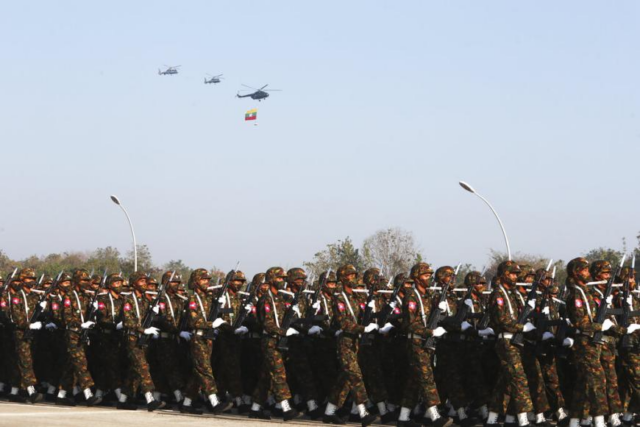Myanmar: US Recognizes Genocide Against Rohingya
21 March 2022


Myanmar armed forces march on the 75th anniversary of Union Day on February 12, 2022 in Naypyidaw, Myanmar. © 2022/ AP Photos
Need for Global Action to Investigate, Prosecute Military Leadership
(Washington, DC) – The United States government has formally determined that the Myanmar military committed the crime of genocide and crimes against humanity against ethnic Rohingya Muslims in Rakhine State, Human Rights Watch said today. The US government should coordinate long overdue action with other countries to pursue justice, both for mass crimes committed against the Rohingya and for those committed against other ethnic minorities and prodemocracy protesters since the military coup in February 2021.
US Secretary of State Antony Blinken, in a speech at the US Holocaust Memorial Museum in Washington, DC, on March 21, 2022, announced, “I have determined that members of the Burmese military committed genocide and crimes against humanity against Rohingya” The US became a party to the Genocide Convention in 1988.
“The US government should couple its condemnations of Myanmar’s military with action,” said John Sifton, Asia advocacy director at Human Rights Watch. “For too long, the US and other countries have allowed Myanmar’s generals to commit atrocities with few real consequences.”
The same military leaders responsible for crimes against the Rohingya carried out the February 1, 2021 coup against the country’s elected civilian government. The junta then systematically attacked those who protested against the coup, subjecting them to mass killings, torture, and arbitrary detention, amounting to crimes against humanity. Escalating attacks on other ethnic minority groups have resulted in additional abuses and atrocities, including war crimes.
Since the coup, security forces have killed at least 1,600 people and detained more than 12,000. Over 500,000 people have been internally displaced and the junta is deliberately blocking aid to populations in need, as a form of collective punishment. Rohingya remaining in the country have faced even greater movement restrictions and harsher treatment, abuses that amount to the crimes against humanity of persecution, apartheid, and severe deprivation of liberty.
The US and other governments should seek justice for the military’s crimes against the Rohingya as well as abuses against protesters and ethnic groups, and impose stronger economic measures against the military leadership, Human Rights Watch said.
The United Nations Security Council – largely because of concerns of a Chinese or Russian veto – has not taken substantive action in response to the Myanmar military’s atrocities. The US should nevertheless press for a council resolution that would refer the situation in Myanmar to the International Criminal Court (ICC). At the same time, the US should press for council action to impose an arms embargo on the Myanmar military.
The ICC prosecutor is presently investigating crimes against humanity related to the forced deportation in 2017 of more than 740,000 Rohingya into Bangladesh, an ICC member state. Myanmar is not a member of the Rome Statute, the court’s founding treaty, so only the UN Security Council can refer all grave international crimes in Myanmar to the ICC for investigation. An ICC referral remains critical to address the full scope of criminality within Myanmar, including for alleged genocidal acts. An ICC referral would also give the court jurisdiction to address other alleged abuses, including by ethnic armed groups in Myanmar.
If the Security Council fails to act, the US should assemble a group of like-minded countries in the General Assembly to pass a resolution calling on countries to impose bilateral arms embargoes on Myanmar and urging them to use their domestic legal systems wherever possible to investigate alleged crimes by Myanmar military personnel.
Many countries have laws that allow their judicial authorities to investigate and prosecute certain serious crimes under international law no matter where they were committed or the nationality of the suspects or the victims. In 2019 Argentine judicial authorities commenced an investigation into Myanmar’s top military and civilian leaders for crimes committed in Rakhine State, including for war crimes and genocide. US officials should consider possible domestic investigations under its own statutes criminalizing genocide committed abroad.
To deter future abuses, the US government should also impose tougher sanctions on the extensive foreign currency revenues the Myanmar military makes from oil and gas revenues, and ramp up enforcement of existing sanctions on military-controlled enterprises in the mining, gemstones, and timber sectors, Human Rights Watch said. The military utilizes the bulk of these revenues to support its expenditures, which include extensive purchases of arms and attack aircraft from Russia, China, and other countries.
In addition to supporting action at the UN Security Council, the US should also support a strong resolution at the UN Human Rights Council in Geneva, mirroring the above steps and ensuring that the UN special rapporteur and the Independent Investigative Mechanism for Myanmar continue gathering and analyzing evidence of serious crimes committed in Myanmar since 2011.
The US should formally support the ongoing case brought by Gambia at the International Court of Justice (ICJ), alleging that Myanmar’s atrocities against the Rohingya violate the Genocide Convention. The case before the ICJ is not a criminal case against individual alleged perpetrators, but a legal determination of state responsibility for genocide. The case could lead to orders that are enforceable under a UN Security Council resolution.
“The Myanmar military will continue to commit atrocities so long as other governments fail to impose measures to hold them accountable,” Sifton said.
Announcements
28 February 2025
Asian NGO Network on National Human Rights Institutions , CSO Working Group on Independent National Human Rights Institution (Burma/Myanmar)
Open letter: Removal of the membership of the dis-accredited Myanmar National Human Rights Commission from the Southeast Asia National Human Rights Institution Forum

Progressive Voice is a participatory rights-based policy research and advocacy organization rooted in civil society, that maintains strong networks and relationships with grassroots organizations and community-based organizations throughout Myanmar. It acts as a bridge to the international community and international policymakers by amplifying voices from the ground, and advocating for a rights-based policy narrative.